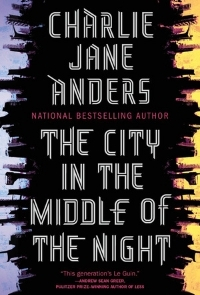
The City in the Middle of the Night
Written by: Charlie Jane Anders
Reviewed by: Brad Williamson
Genre: Science-Fiction / Romance
Score: 1.5/5
Excited as I was to read this book, it never coalesced into something I could enjoy. I appreciated the story and am glad I read it, but it was too frustrating and fleeting to be immersive.
The setting is good: on a tidally locked planet the descendants of a colonizing ship have splintered into two cities within the thin belt of habitable land between the day- and night-sides. The history of these settlers and how the cities came to be is never fully explained, but tidbits are given throughout the book that paint a fairly comprehensive picture of war, strife, and greed, which has left certain descendants in power of the cities while everyone else barely survives.
The narration alternates between two main characters; one is told in the present tense and the other in past. At first this back-and-forth is interesting and mysterious, but nothing comes of it. One feels that the difference in the tenses is leading to something in the end, some reveal or twist, but the conclusion proves that it was only a ploy. The prose itself is good, quite good in some places, but it’s overshadowed by this heavy-handed style of alternating perspective.
But the setting is so alluring and the prose fresh enough that if it was just this, I could have still loved the book. In fact, I did love the first 100 pages. What ultimately made the book unenjoyable to me were the characters. They never learn from their mistakes, fail to evolve throughout their adventures, and repeat dialogue incessantly. You think they’re starting to grow, only to read the next scene repeat the same shortcomings that have been around throughout the entire story. This made it difficult to cheer for them, or even to connect with them at all. So despite enjoying the world, I didn’t care about it because no one in that world was worth an emotional investment.
Much of the plot also meanders as if wholly unplanned, either appearing from nowhere out of necessity or concluding without explanation. No one seems to have a concrete purpose and though there are a variety of driving forces, none of them are focused on. The first 100 pages are polished and concise, but all this clarity vanishes soon thereafter. To me it felt like half a dozen short story ideas compiled into a novel that because they weren’t closely related failed to mesh into a fully realized tale.
Good in several aspects, but severely lacking in vital ways, this novel disappoints though does not completely bomb. Read it if it interests you, but don’t expect too much. You might enjoy it more than I did because it does have something to offer, but don’t be disappointed if it’s not exactly what you were expecting.
Recent Comments